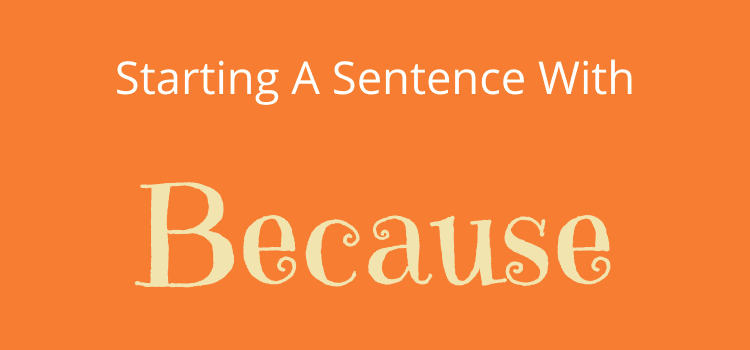
Yes, of course, you can start a sentence with because to indicate a reason.
You probably won’t use it very often. But when you do, you only need to be a little careful and make sure you use it correctly.
There is a simple way to check that your grammar is correct when you use the word because as the first word in a sentence.
Simply check that you have written a complete sentence and not created a sentence fragment.
What part of speech is because?
In grammar, because is categorized as a conjunction.
It means a word that connects clauses or sentences or coordinate words in the same clause.
Common conjunctions you use all the time are for, and, nor, but, or, yet, and so.
You often see these types of words called linking words.
I think that is easier to understand.
They are the glue that links two ideas together in one sentence.
A conjunction or linking word expresses a connection.
It can mean addition, contrast, comparison, emphasis, time sequence, or reason.
When you use the word because you are expressing a reason.
Let’s look at how you can use it correctly.
Indicating reason with because
We use the word all the time to connect actions with reasons.
You could write each part in a separate sentence. But it usually reads quite badly.
It rained. I forgot my umbrella. I got wet.
We can quickly improve it by using linking words.
For a reason, because, so, and therefore are the three most common words we use.
It rained, and because I forgot my umbrella, I got wet.
I forgot my umbrella, and it rained, so I got wet.
I forgot my umbrella, and it rained; therefore, I got wet.
When you use a linking word in a sentence, it’s easy to join your ideas together.
But what about using because at the beginning of a sentence?
How to start a sentence with because
The number one problem you will encounter when you start a sentence with because is that you will often create a sentence fragment.
It means that a sentence is incomplete because it is missing one of the two main elements: a subject and a verb.
Here’s a simple example.
“Why didn’t you go?”
“Because of the rain.”
The answer to the question is a sentence fragment. There is no subject or verb.
It’s so easy to fix this type of error. All you need to do is add a subject and verb.
“Why didn’t you go?”
“Because it rained.”
Once you know that you need a subject and verb, you can structure your sentences correctly.
This makes it possible to start a sentence with because any time you like.
Because it was raining, I didn’t go.
It is worth noting that in some cases, answering a why question with because, as in the first example, is not always incorrect.
However, it is more acceptable in speaking than in writing.
More ways to use because to start a sentence
The most common use in writing is using because as a subordinate conjunction.
It means that you connect a subordinate clause and the main clause.
Now you can avoid a sentence fragment by using because in a subordinate clause.
All you have to remember is to include a comma between the subordinate and main clause.
Because of the rain, I didn’t go to the picnic.
There are many ways you can use this structure, with or without a verb and subject.
Because of the salary, I decided to leave the job after only a few months.
Because I was on such a poor salary, I decided to leave the job after only a few months.
Because of the traffic, I prefer to take the train to work each day.
Because he is only five-foot-six, Jimmy didn’t qualify for the police force.
You can see how easy it is to start a sentence with because and be correct every time.
A word of warning about commas
I’m sure you know that when you use a subordinate and main clause, you can reverse the order of the sentence.
It’s an easy way to rewrite a sentence to add variety.
So I’ll change the order of the earlier example sentences.
I decided to leave the job after only a few months because of the salary.
I decided to leave the job after only a few months because I was on such a poor salary.
I prefer to take the train to work each day because of the traffic.
Jimmy didn’t qualify for the police force because he is only five-foot-six.
Can you see a minor difference?
Yes, the comma has disappeared.
When you start a sentence with the main clause, there is no comma before because in the subordinate clause.
Summary
There is no reason at all to avoid using a conjunction to start a sentence.
You can use any of them.
But you do need to be aware of the small traps that they can create.
As long as you check and ensure your sentences are complete and that they make sense, you’ll be fine.
But with because make sure you follow it with a subject and verb.
If not, use a comma to join it to the following main clause.
Because you want to write well, I’m sure you will check carefully now.
Related reading: A Comma Before Because After A Negative Clause




Thank you for the very good advice, Derek. I am just roaming through the house called English language. Have a nice rest of the week! xx Michael